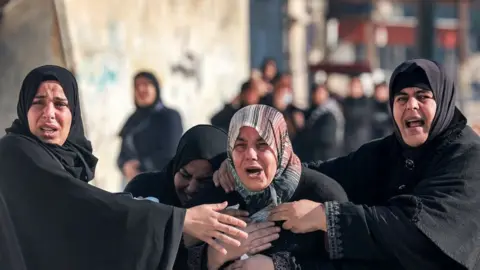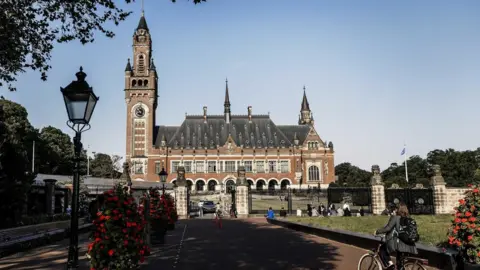What is South Africa’s genocide case against Israel at the ICJ?
 Getty Images
Getty ImagesThe International Court of Justice (ICJ) is due to rule on a bid by South Africa to order Israel to stop its military offensive in Rafah. It is part of an ongoing case which began in December 2023 alleging Israel is committing genocide against Palestinians in Gaza.
Israel rejects the allegation of genocide as "baseless".
What is the International Court of Justice?
The ICJ is the top court of the United Nations (UN).
Based in the Hague, in the Netherlands, it was established after World War Two, to settle disputes between states.
It also gives advisory opinions on legal matters, which is what it is being asked to do with Israel.
Unlike the International Criminal Court (ICC), the ICJ cannot prosecute individuals for crimes of the utmost severity, such as genocide.
But its opinions carry weight with the UN and other international institutions.
 EPA
EPAWhat is genocide and what is the case against Israel?
South Africa alleges Israel is committing genocide against the Palestinians, following Hamas's 7 October attack.
Hundreds of Hamas gunmen crossed from the Gaza Strip into southern Israel, killing about 1,200 people, mainly civilians, and taking 252 hostages back to Gaza.
Since Israel launched its military campaign against Hamas in response, more than 35,800 people have been killed in Gaza, according to the Hamas-run health ministry.
Evidence submitted by South Africa claims "acts and omissions" by Israel "are genocidal in character because they are intended to bring about the destruction of a substantial part of the Palestinian national, racial and ethnical group".
This describes what Israel is actively doing, such as carrying out air strikes, and what it is allegedly failing to do, such as, according to South Africa, preventing harm to civilians.
The claim also highlights Israeli public rhetoric, including comments from Prime Minister Benjamin Netanyahu, as evidence of "genocidal intent".
Under international law, genocide is defined as committing one or more acts with the intention to destroy, in whole or in part, a national, ethnic, racial or religious group.
Those acts are:
- killing or causing serious bodily or mental harm to members of the group
- deliberately inflicting on the group conditions of life calculated to bring about its physical destruction in whole or in part
- imposing measures intended to prevent births within the group
- forcibly transferring children of the group to another group
How has Israel responded to genocide allegations?
Mr Netanyahu said: "It is not we who have come to perpetrate genocide, it is Hamas.
"It would murder all of us if it could.
"In contrast, the IDF [Israel Defense Forces] is acting as morally as possible."
Israel's military says it takes a raft of measures to avoid civilian casualties.
These have included:
- airdropping flyers warning of imminent attacks
- calling civilians' phones to urge them to leave targeted buildings
- aborting some strikes when civilians are in the way
The Israeli government has repeatedly stated its intention is to destroy Hamas, not the Palestinian people. It says it will ignore any order from the court to halt its offensive in Rafah or anywhere else in Gaza.
What has the court ruled and when will there be a final verdict?
On 26 January 2024, the court ruled on a number of interim steps which South Africa had asked it to take against Israel.
The key request was for the court to order Israel to immediately halt operations in Gaza, but the court did not uphold this.
However, it did instruct Israel to prevent its military from committing acts which might be considered genocidal, to prevent and punish incitement to genocide, and to enable humanitarian assistance to the people of Gaza.
The court also ruled that it had the legal right to proceed with the genocide case. The president of the court at the time, Joan Donoghue, told the BBC in April that the ICJ did not decide that there was a plausible case for genocide, but rather that the Palestinians had a right to be protected from genocide.
A final verdict on the case could take several years.
Rulings are legally binding on countries which formally accept the ICJ - these include Israel and South Africa - but in practice, unenforceable by the court.
In 2022, the ICJ ordered Russia to "immediately suspend military operations" in Ukraine - but the order was ignored.
Why has South Africa brought the case?
South Africa has been highly critical of Israel's military operation in Gaza.
And as a signatory to the UN's 1948 Genocide Convention, it has an obligation to act, it says.
The governing African National Congress also has a long history of solidarity with the Palestinian cause.
It sees parallels with its struggle against apartheid - a policy of racial segregation and discrimination enforced by the white-minority government in South Africa against the country's black majority, until the first democratic elections, in 1994.
The country condemned the 7 October attacks and called for the release of the hostages.
"Our opposition to the ongoing slaughter of the people of Gaza has driven us as a country to approach the ICJ," said President Cyril Ramaphosa. "As a people who once tasted the bitter fruits of dispossession, discrimination, racism and state-sponsored violence, we are clear that we will stand on the right side of history."
Correction 13th February: This article wrongly reported that about 1,300 people had been killed following the 7th October attack by Hamas. This was based on counting those who later died from their injuries in addition to the figure of more than 1,200. The article has been amended to now refer to about 1,200 deaths, a figure which includes those deaths and which Israel says is not final.
Additional reporting by Damian Zane.
